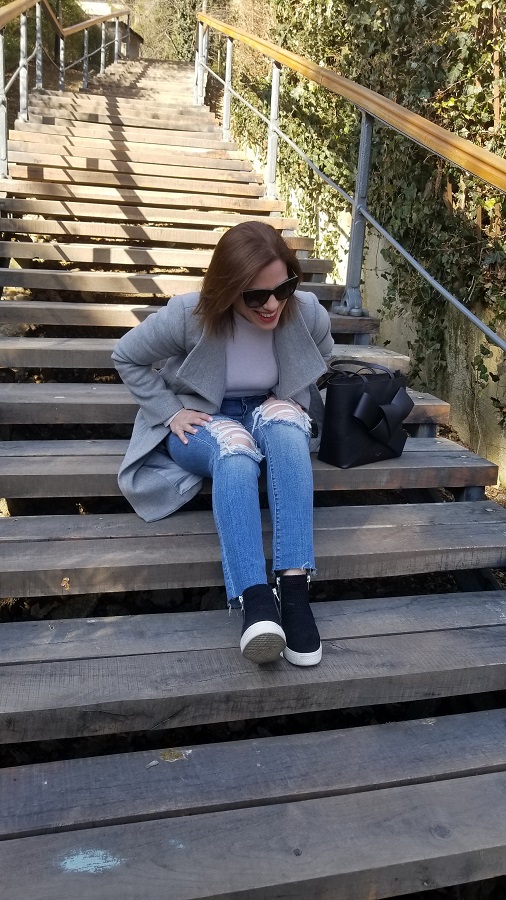St John's Fortress, the Latest Jewel in Sibenik's Impressive Crown
September 23, 2022 – Something quite extraordinary is happening in Sibenik, with St John's Fortress being the latest chapter in quite the superlative story. If it is culture, heritage, and innovative tourism that you're looking for, then this is the city for you!
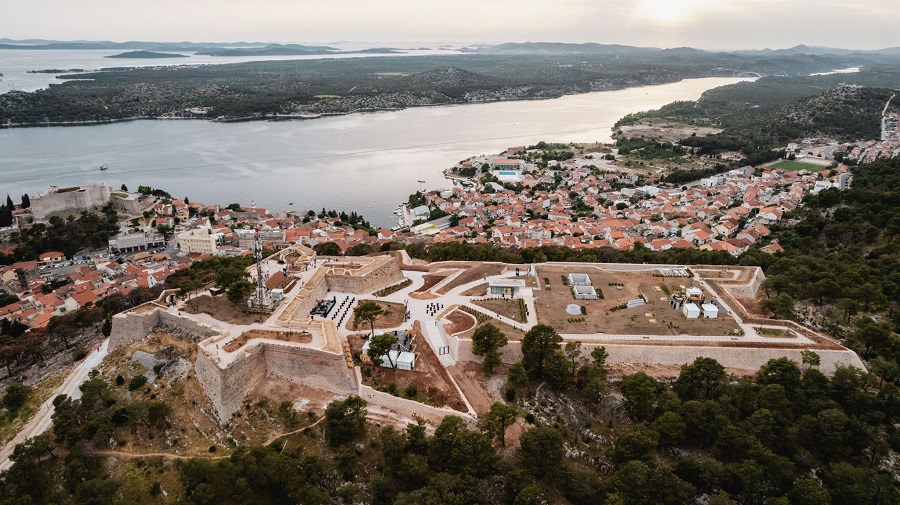
This is the only city in all of Croatia which has not one but two UNESCO World Heritage Sites, and one of those, the Fortress of St Nicholas, is part of a project which is helping to redefine Sibenik as a leading light in Europe in the revitalisation and innovative use of cultural heritage. For some destinations, it's enough to merely showcase a historic building in its dilapidated form, but Sibenik has not only aggressively – and successfully – chased EU funding for the renovation of its magnificent fortresses and has managed to combine heritage and tourism in some quite innovative and spectacular ways.
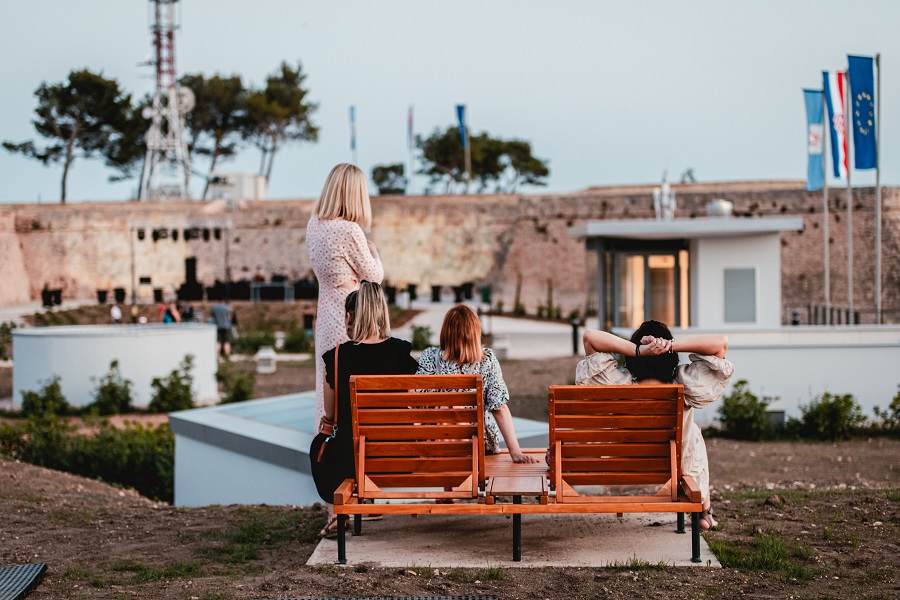
St Michael's Fortress, for example, with its majestic position and views high over the city, has become an outstanding and intimate concert hall which has attracted the likes of Lorde, Jack Savoretti and Bryan Ferry, to name but three. At the core of this innovation is the Fortress Culture of Sibenik, a public institution which was formed in 2014 and which, in 8 action-packed years, has managed to transform the city's famous fortresses into additional bastions of good music, knowledge and new technologies used in the interpretation of history and a new audience. The latest success story – and another fabulous and diverse addition to the Sibenik fortress story – can be found at St John's Fortress, the largest and highest land fortress in Sibenik, which opened in June this year. The revitalisation of St John's Fortress story started back in 2016 with the city's biggest ever grant from EU funds. The fortress comprises two main parts – the so-called 'Star', which fortifies the southern part of the fortress, and the 'Pliers', which are an outer fortification in its northern section. Divine views are guaranteed, but it is what one finds additionally which makes St John's Fortress such an exciting addition.
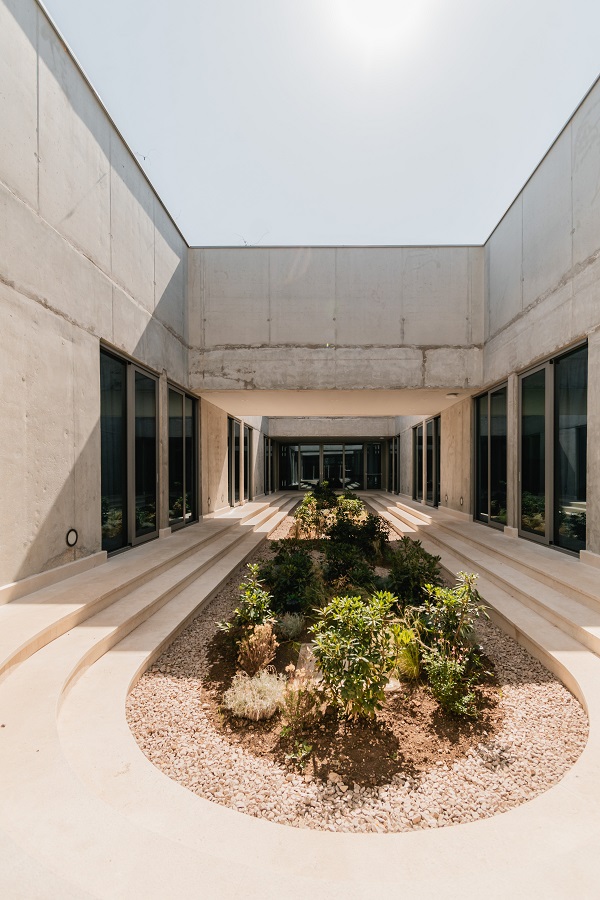
Far more than just a fortress with views to admire and a history to behold, a key component of St John's is education. For below Pliers, a new educational campus can be found.
"Campus business boundaries are where we determine them. Every day we find out new, so far undiscovered information and stories about the city, we work with new technologies and strive for modern ways of interpretation."
Here, surrounded by centuries of Sibenik stone heritage, a new campus is open to inspire students, artists, and young experts in this most atmospheric of settings. There are classrooms, conference rooms, and even bedrooms for overnight stays for study and other educational visits. An inspirational setting will hopefully rub off on the creative youth who enjoy it. Educational tourism is an exciting new direction for the Fortress of Culture's activities in the future.
"In the past work of the Department (and the Institution in general), we have achieved countless contacts and partnerships, and this infrastructure brings us the potential to raise all our cooperation to a higher level if there is desire, will and agreement. In general, Šibenik is offered the opportunity to not only be a 'city of fortresses' (for which it is already recognized) but to become a top centre for the study and evaluation of heritage. We want to be a key part of that process." says Josip Pavić from the Department of Heritage Research and Interpretation.
Such a use of a historic building is somewhat unique in Croatia, and the 14 en-suite bedrooms, large communal kitchen dining and other communal rooms are all hidden among the walls of the fortress, providing a hidden, private and intimate space for concentrated creative activities. This is Heritage Management 2.0. The goal is to emphasise the importance of developing and diversifying educational and cultural tourism, creativity, sports and similar products by encouraging the dispersion of programmes throughout the year.
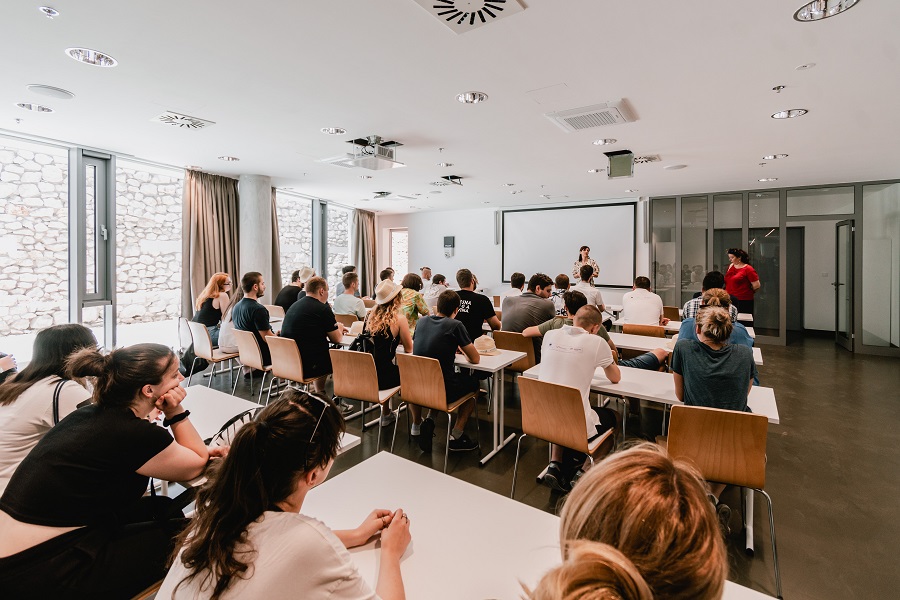
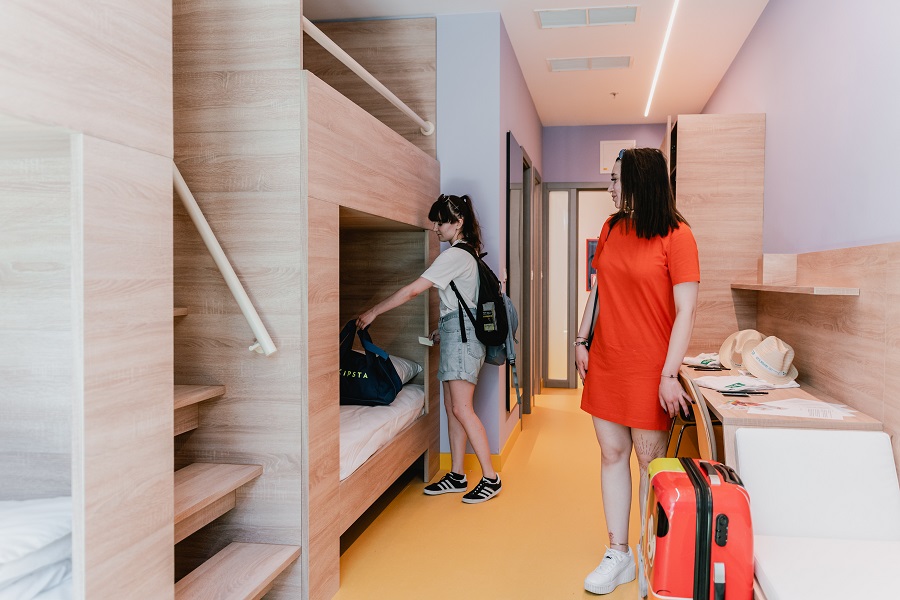
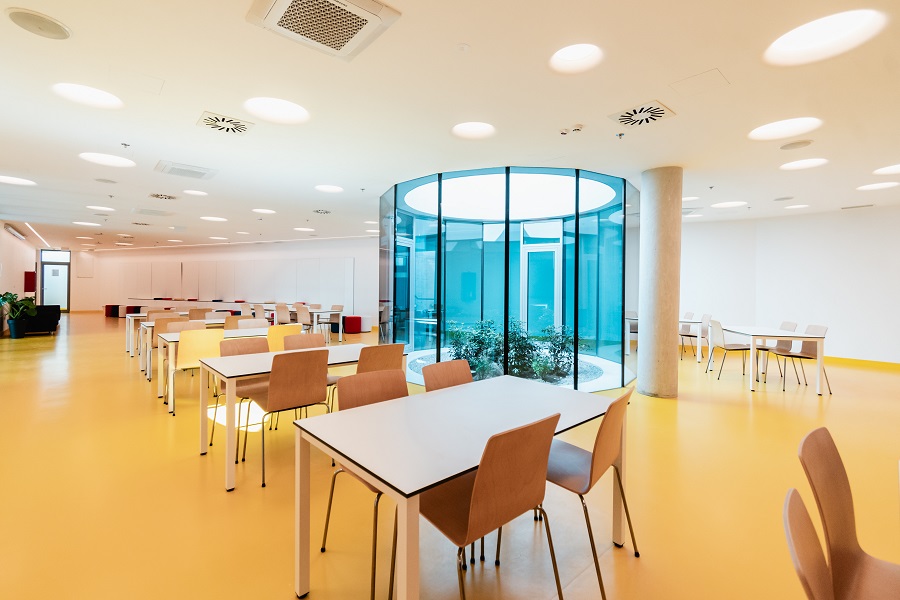
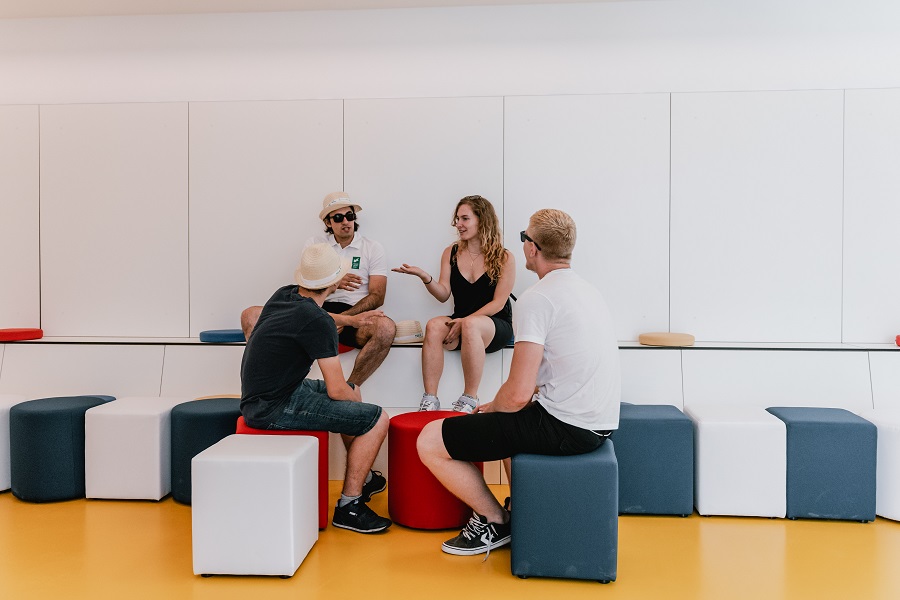
"The campus at St. John's Fortress brings up the possibility of the further expansion and development of international collaborations that have already been started and established through the work of the Department for International Cooperation and Projects."
As Croatia continues to find ways to improve the 12-month, sustainable tourism, projects such as the St John Fortress area are beacons of light leading away. Intended for regular tourism as much as its educational aspect, St John's Fortress is open 365 days a year. There are daily guided tours available, and the campus is intended for organised groups. One nice aspect of the Sibenik fortress project is that entrance tickets often include entrance to other fortresses, in this case, the exquisite Barone Fortress.
"Membership in two large European networks that bring together heritage sites, primarily fortifications; numerous recognitions that confirm that the Fortress of Culture and Šibenik's fortresses are already well known as an outstanding example of good practice in the reuse and successful management of restored cultural heritage; as well as the partnerships realized through the projects carried out so far provide us with the opportunity to present both St. John's Fortress and Campus to a wide circle of European experts as an ideal location for holding various educational programs and activities, from summer schools, lectures, seminars and workshops to artistic residencies and exhibitions. We will plan our future collaborations and projects precisely on this track," says Đurđa Vrljević Šarić from the Department of International Cooperation and Projects.
The easiest way to explore the fortress is with Mastercard, whose cardholders get many benefits throughout the year thanks to Mastercard’s partnership with Fortress of Culture. This public institution that manages the fortress made sure that like-minded partners follow its every step in creating a fortress of knowledge and a new cultural audience.
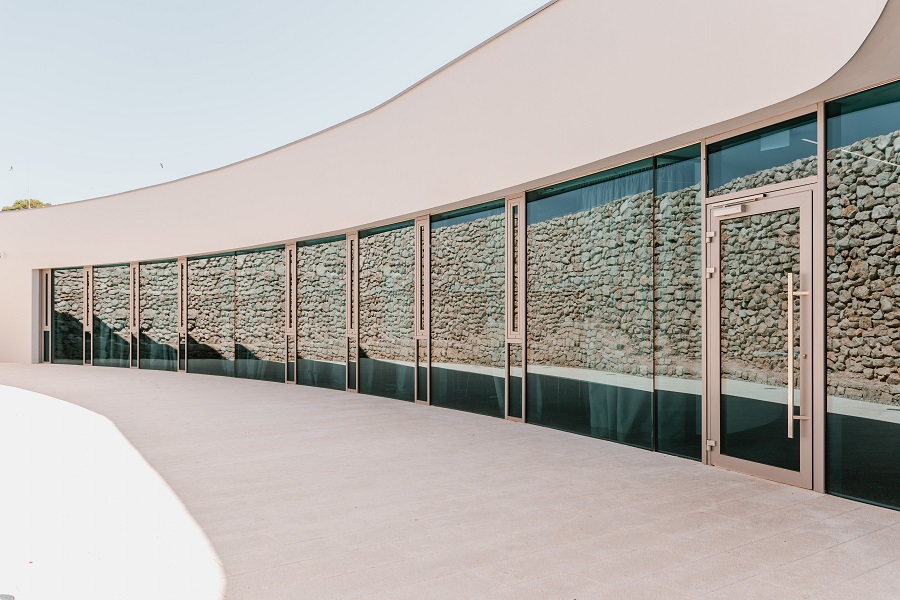
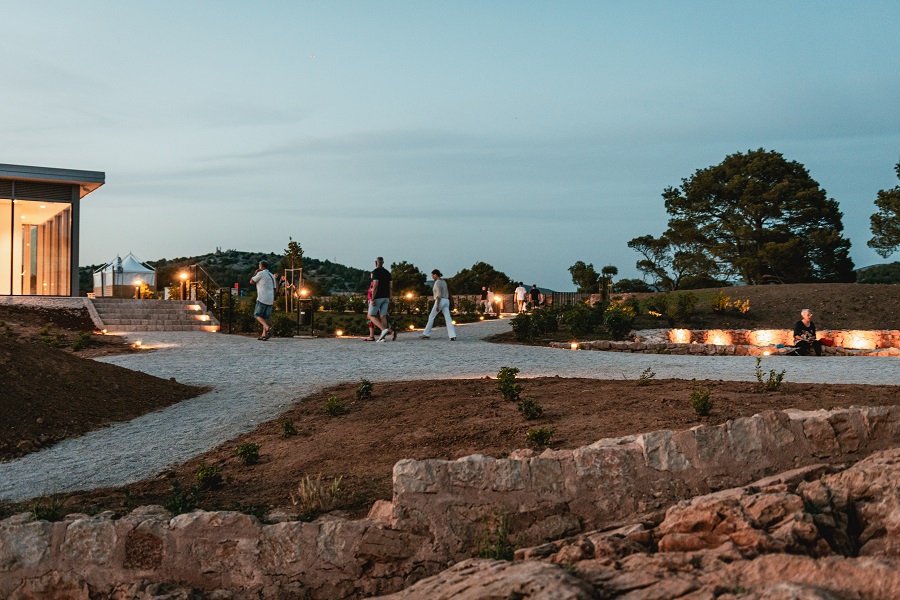
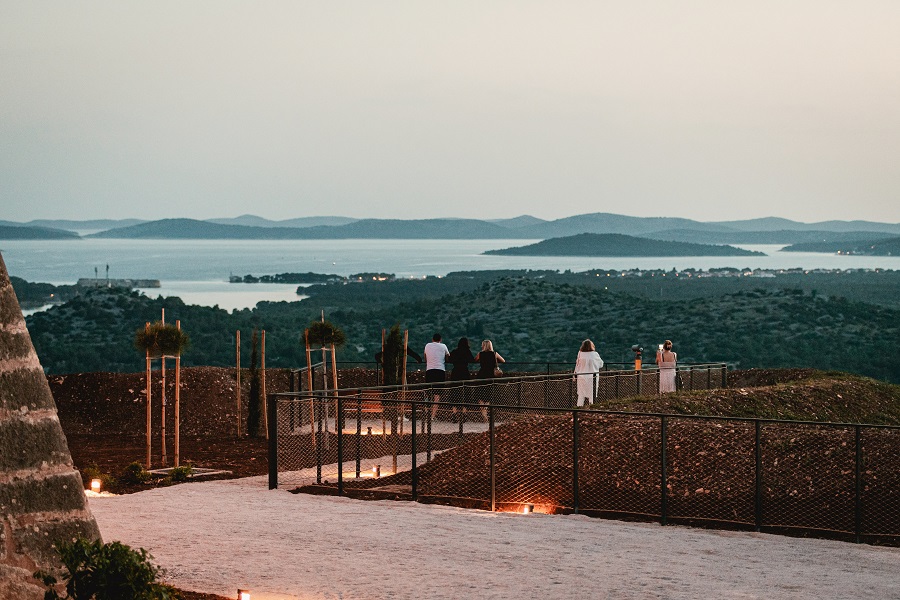
For more information about St John's Fortress and all the others, visit the official Sibenik Fortresses website.
Epilepsy Patients Wait 18 Months, Crucial Diagnostic Machine Remains Broken
September 23, 2022 - It is no secret that public health in Croatia can be painfully slow and inefficient. And while most people experience that inefficiency in waiting times for routine check-ups, the number of people whose lives depend on it is heart-breaking. It ranges from bloodwork crucial for cancer diagnoses and life-saving medicine to potentially life-changing tests that could be done using an old machine. Nothing fancy, no super-advanced technology, just a machine that has been there for ages. Then it broke down. One year ago. Epilepsy patients are left waiting for a potentially life-changing diagnosis.
Epilepsy is one of the most common neurological disorders with a wide range of symptoms. It causes seizures of varying intensity, duration and frequency. While some people can carry on with their daily lives with minor interruptions, for some, it is debilitating. The cortical stimulator machine is used for detecting which parts of the brain are causing epileptic seizures and to see if it is possible to operate on those parts and potentially set the patients free of this life-altering condition. Unfortunately, if sensitive parts of the brain are affected, where surgery could interfere with vital functions, it might not be the solution, but often enough, it could prove helpful. At the very least, the test might set the patients on the right course for treatment or management of the condition. KBC Zagreb had one, and then it broke down in September 2021.
As RTL reported in April 2022, when the old machine broke down, the hospital showed a willingness to get a new one but somehow "got stuck". In the meantime, the patients have been on hold; their epileptic seizures keep coming one after the other, and the medical staff can't even give an approximate date on the phone when they can expect an appointment. Until the device is fixed, there will be no diagnoses.
Back then, it was also stated that there were 19 patients on the waiting list for diagnostics using the device, and these patients, according to prim. Dr Novak, in the meantime, also reported for outpatient neurological check-ups at the Centre for Epilepsy.
About 40 thousand people have epilepsy in Croatia. The disease can be controlled in most cases. Still, for about 25 per cent of patients, medicine is not enough, and doctors sometimes decide to remove the parts responsible for epileptic seizures surgically.
One of such patients took to Reddit to plead for the help of the media in sharing his story, desperate that one year later, nothing has changed and that the waiting list of 19 people has not moved. Having waited for over 18 months, he suspects the list might even be longer by now. He experiences partial epileptic seizures daily, medicine alone does not help, and the only hope is the option of surgery, which can only be determined by tests on the machine in question.
And here is where the absurdity lies. Apparently, "KBC Zagreb themselves stated that the funds are available, the father of a patient offered to collect money through donations, and one even allegedly offered to buy a new machine and donate it to KBC, to which he was told that it could not be done that way". The patients are left wondering and guessing why the delay is happening. Was it Covid setting it all back, maybe private interest that is not being met, something else? Who knows.
The very least we can do is talk about it, share the desperate calls for help, ask those in charge to acknowledge the problem, and maybe even start working on it. Wouldn't that be a wonder?
If you are one of the patients, their family or friends and would like to share your story; or are in a position to help, advise or direct the patients who still need help, please contact us.
For more, make sure to check out our dedicated Lifestyle section.
I Married a Croat and Moved to Croatia: Emily Danicic from UK
September 23, 2022 - A new series on TCN looking at foreigners who moved to Croatia for a very specific reason - marrying a Croat. First up, Emily Danicic, who moved from the UK to Dubrovnik.
Sometimes on TCN, great content breeds more great content. The recent Croatian Returnee Reflections series has been one of the most interesting features we have had this year, with more than 50 returnees already contacting us to take part. You can follow the series here.
Among the many replies was an email from a young lady called Emily Danicic from the UK, whose father returned to Dubrovnik after 46 years in London. Emily said she had married a Croatia and had also moved to Croatia, which gave me an idea for a fun new series - I married a Croatia and moved to Croatia. I asked Emily if she would be game enough to kick off the series, and here is her response. I guess the critics will say that because she has a Croatian parent, she is not a 100% foreigner marrying a Croat, but this is a fun read and relevant, and I hope it will encourage others to get in touch with their stories. Over to Emily...
My name is Emily Daničić; I was born in the UK in 1977 to an English mother and Croatian father. Up until 10 years ago, the UK was my home. I now live in Dubrovnik with my Croatian husband & 3 children, 2 of which are from my first marriage.
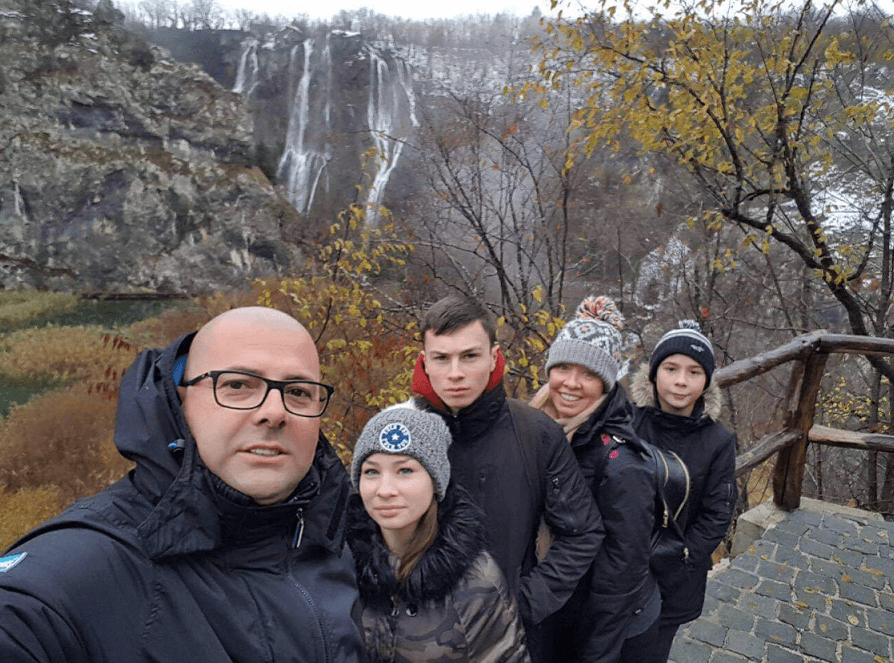
1. Let's start at the beginning. Tell us about your Croatian love and how did you meet?
I met my husband when we were teenagers (as friends), as I used to come out to Dubrovnik every summer when school finished to stay with my grandparents. At the time, our paths went in different directions. Some years later, with 2 kids and a husband at the time, our paths crossed again, one thing led to another, I got divorced… we entered into a long-distance relationship, had a son together, and after our wedding in 2011 me and the children decided to make the move to Dubrovnik.
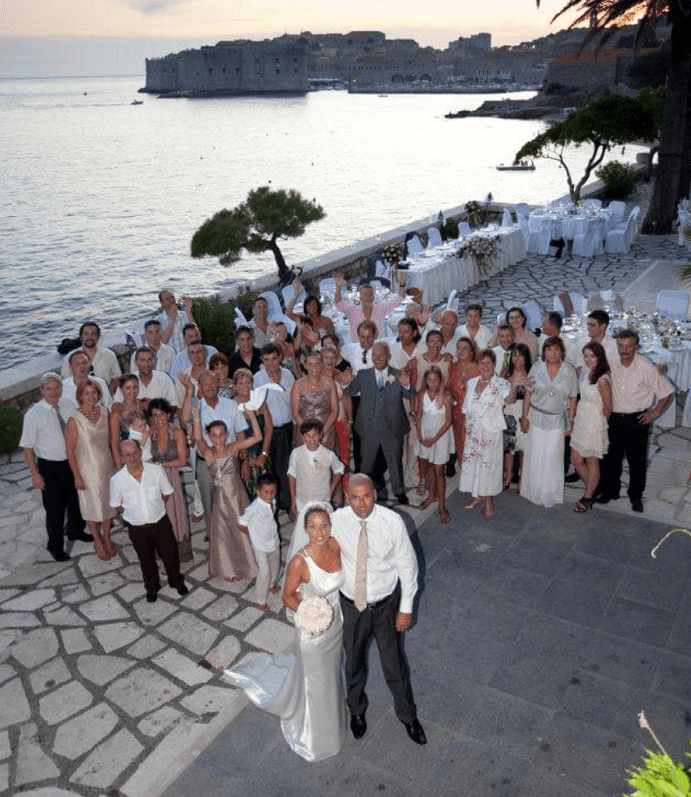
2. How much did you know about Croatia or Croatian culture before you met?
I knew a lot about Croatia and the culture due to my father being Croatian and having close contacts there.
3. Tell us about meeting the Croatian family for the first time.
This is something that I was dreading, as my in-laws were originally from a small village in Hercegovina but living in Dubrovnik. There were very old school, so to speak. But I was pleasantly surprised by how they accepted my 2 older children and me into their family, making me very welcome. My father-in-law used to give me a shot of Rakija every morning, and my mother-in-law was always trying to feed me. Sadly it's been 5 years since they passed away, and I miss them dearly.
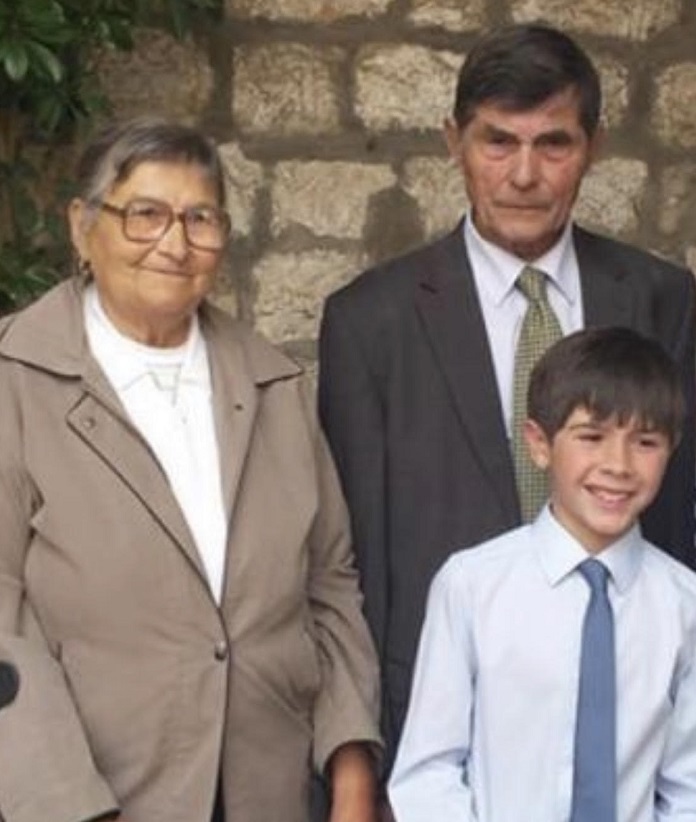
4. And, of course, the proposal and the wedding. Was it a big Croatian affair?
Due to us already having a son together we decided to have an intimate wedding with close friends & family (which was met with slight disapproval) at Hotel Excelsior in Dubrovnik, as we did not want to have the big Croatian wedding.
5. And you decided to move to Croatia! Was that an easy decision? What did your family say?
It wasn’t an easy decision as my children were settled in school in the UK, and I had friends and family I would miss, but they were happy for me. So I sold and packed up, and we all went off to Dubrovnik with dog in tow.
6. What were your perceptions and fears before you moved?
My worst fears were for my children having to leave there school and friends and start all over again in a new country with a new language, at the time, they were 6,11&13 years old, for my older two, it was a struggle at first, but eventually, they settled in well, although school was not easy.
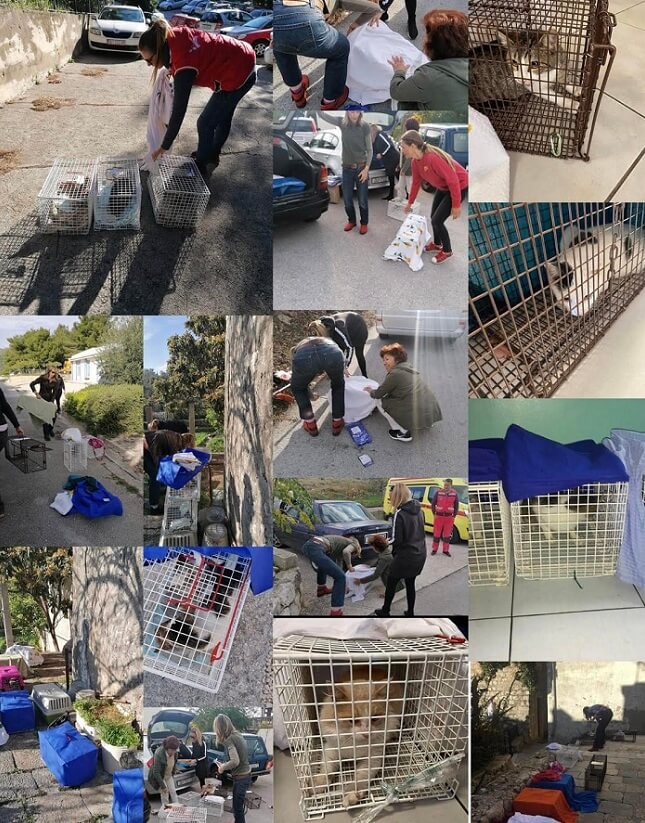
7. And tell us about life here. What do you love about living in Croatia, and what do you dislike?
For the children living here is great they have so much freedom, and i feel safe when they are out. I love the slow pace of life and the hospitality of people making you feel welcome. The weather is so lovely here in the summer, and the winters are mild. I love sitting on my terrace while drinking my English tea and looking out onto the harbour. Another thing I love doing is helping the street cats; I've got involved (volunteering) with a UK-based charity that helps the stray street cats of Dubrovnik and surrounding areas ie TNR (trap neuter release), feeding as well as other medical needs, taking to vets for treatment they might need. (SOS Dubrovnik cats) you can find them on Facebook. I now have 8 cats at home that I have taken in from the streets, although my husband kept telling me no more cats after each one or he would divorce me haha. He is still here, and so are the cats, Although he tries to give it the big macho Croatian, he fusses over them more than me (he will kill me for this).
People don't like to queue here and especially in the supermarket and banks. If I was given a kuna for every time someone pushed in telling me they would be late for their bus, I would be a millionaire!
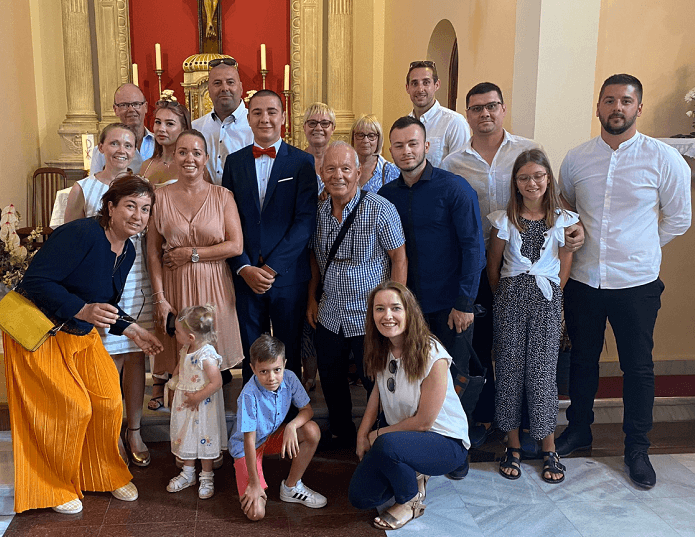
8. Without wanting to start any marital wars, any comments on being married to a Croat do you think? Are there any particular quirks, positive or negative that you have noticed?
I can’t speak for all Croatians, but my husband is very impatient but is also a very passionate person about things he believes in, ie football and his homeland. One of his annoying habits is to keep going on about “PROPUH”(a draft), although I think it's a normal thing here as everyone seems to think they are going to die from “PROPUH”, haha. I've learnt to ignore and carry on. He always seems to think he knows everything and doesn’t like to be told otherwise, which seems to be the case with most Croatian men. Everything is “Sutra cemo” (tomorrow), although I should point out that if it's something important, he will get things done. He is a great help around the house when I need it and is not afraid of the vacuum cleaner haha. He is also a fantastic father and gets on really well with my older two from my first marriage.
9. Your advice to anyone else thinking of moving into a Croatian family and relocating to Croatia?
For me, it was easy as I knew the culture and spoke the language. From observing other families here, my advice would be to not live with your in-laws. I did not have this problem but know of people who did.
I have no regrets about leaving the UK and am loving my life here. I do miss my family and friends back in the UK (and the shopping), but it's only a two-and-a-half-hour flight away.
PS If anyone is thinking of holidaying in Dubrovnik and requires airport transfers or private day trips, and would like to support a small family buisness , get in touch at - This email address is being protected from spambots. You need JavaScript enabled to view it.
Thank you x
****
Thanks, Emily!
Did you marry a Croat and move to Croatia? Want to take part in this series? Email This email address is being protected from spambots. You need JavaScript enabled to view it. Subject I Married a Croat.
What's it like living in Croatia, and where can you get the best survival tips? TCN CEO Paul Bradbury and TCN Editor Lauren Simmonds have teamed up to publish Croatia, a Survival Kit for Foreigners.
Follow Paul Bradbury on LinkedIn.

Croatian 2021 Census: Less Inhabitants, Less Men, Less Catholics
September the 23rd, 2022 - The final Croatian 2021 Census results have finally been published by the Central Bureau of Statistics (CBS), which shows that there are less inhabitants, less men, and less people who identify as Catholic.
As Poslovni Dnevnik writes, the Central Bureau of Statistics has now published the final results of the Croatian 2021 Census on the total population by gender and age, as well as by ethnicity, religion, citizenship and mother tongue.
According to the Croatian 2021 Census, the Republic of Croatia currently has 3,871,833 inhabitants, of which 1,865,129 are men (48.17%) and 2,006,704 are women (51.83%). Compared to the 2011 Census, the number of inhabitants decreased by 413,056 persons or 9.64%.
The total number of inhabitants decreased across all of the country's counties, and the largest relative decrease in the number of inhabitants was rather unsurprisingly present in Central and Eastern Croatia, more precisely in Vukovar-Srijem County (20.28%), Sisak-Moslavina County (19.04%), Pozega-Slavonia County (17.88%). Brod-Posavina County (17.85%) and Virovitica-Podravina County (17.05%).
The share of the population aged 0 to 14 stands at just 14.27%, and the share of the population aged 65 and over is a considerably higher 22.45%.
Croatia's national population structure as of 2021
The results of the Croatian 2021 Census show that the share of Croats in the national structure of the population stands at 91.63%, the share of ethnic Serbs stands at 3.20%, Bosniaks 0.62%, Roma 0.46%, Italians 0.36% and Albanians 0.36%, while the share of other members of national minorities is individually less than 0.30%. The share of people who have declared regionally amounts to 0.33%, and the number of people who did not want to declare this at all amounts to 0.58%.
Religious affiliation
According to religious affiliation, 78.97% of people refer to themselved as Catholics, 3.32% refer to themselves as Orthodox, there are 1.32% Muslims, and non-believers and atheists amount to 4.71%, while 1.72% of people didn't want to state their religion or religious beliefs whatsoever.
According to data by religion from back in 2011, it can be seen that the number of Catholics fell by a not insignificant 7.3 percent. The number of atheists, agnostics and skeptics has also increased somewhat.
Data by religion from 2011
Catholics – 3,697,143 – 86.28%
Orthodox - 190 143 - 4.44 %
Non-believers and atheists – 163,375 – 3.81%
Those who didn't declare their religious beliefs - 93,018 - 2.17%
Mother tongue
When it comes to what Croatia's inhabitants in 2021 have as their mother tongue, 95.25% of people declared that their mother tongue was Croatian, and 1.16% of people declared that their mother tongue was Serbian. The share of people with another mother tongue is individually less than 1.00%.
There are 28,784 foreigners living in Croatia
Of the total number of inhabitants of the Republic of Croatia, 99.24% have Croatian citizenship, while foreign citizens make up 0.74% or 28,784 of the population, according to HRT.
For more, make sure to check out our dedicated politics section.
Bloomberg Ranks Croatia Among Best Digital Nomad Destinations
September the 23rd, 2022 - The widely read Bloomberg has listed the Republic of Croatia among the top destinations for digital nomads, a form of living and working that is rapidly gaining in popularity.
As Poslovni Dnevnik writes, Bloomberg has included Croatia among the countries across the world that are leading in programmes for attracting digital nomads, and they also published a photo of gorgeous Dubrovnik, which is a confirmation of the city's recognition in this growing market.
Bloomberg published this overview of the world's leading countries when it comes to programmes designed specifically for digital nomads on its Bloomberg Business portal and on social media, listing fourteen countries in it, six of which are in Europe.
In addition to the Republic of Croatia, Germany, Italy, Malta, Greece and Portugal are also other European countries the publication has highlighted, according to a statement from the City of Dubrovnik.
For each country, Bloomberg provided some basic but useful information on how to apply for temporary residence if you're a digital nomad, as well as that another twelve countries and their announced programmes which are aimed at attracting people who work remotely and want to stay in one particular place for a longer period of time.
The City of Dubrovnik also noted that due to the need for greater diversification of Croatia's southernmost city's overall tourist offer and the development of innovative content in cooperation with the Tourist Board of the City of Dubrovnik and in partnership with Total Croatia News and Saltwater Nomads, at the time of the beginning of the coronavirus pandemic, they launched an initiative for the further development of Dubrovnik as a destination for digital nomads.
This initiative has been going on for two years now and is constantly being upgraded, with the holding of various conferences, workshops, competitions and meetings where digital nomads are presented with the advantages of living and working in the extreme south of Croatia.
For more, make sure to check out our dedicated travel section.
Biograd Company Angelina Yacht Charter Now Owns 85% Share in Ultra Sailing
September the 23rd, 2022 - The Biograd company Angelina Yacht Charter has now acquired an 85% share in the Split-based charter company Ultra Sailing, a move which is continuing and furthering the ongoing process of consolidation in this field.
As Poslovni Dnevnik/Marija Crnjak writes, with this particular acquisition, the largest charter company in all of the Republic of Croatia, which is otherwise the largest charter market in the world, is continuing to blossom.
The joint fleet of a total of more than 260 vessels that will be available to sailors next season will continue to be rented under the existing brands that have established themselves on the market, and will be distributed to cover all parts of the Croatian Adriatic, from Istria all the way down to Dubrovnik.
This will be just one of the advantages of this significant transaction, which was carried out in accordance with the strategic goal of continuous growth of the Biograd company Angelina Yacht Charter, Luka Sangulin, the company's director, explained.
"We've been aware for a long time now that only bigger and stronger players can survive in the unstable market of services that depend on a series of circumstances out there on the global market. At the same time, this sector proved to be very tough and resilient even in the circumstances of the coronavirus pandemic, when people were thinking of all possible ways to get on board a boat and have time at sea.
The charter season is also a longer one and attracts guests with higher paying power. By taking over the majority stake in Ultra Sailing, we'll be even stronger when it comes to resisting the grouping of large global players that are also present here on the Croatian market, such as Sunsail, Dream Yacht and Navigare," explained Sangulin.
Ultra Sailing is also an authorised dealer for Benetau and Fountaine Pajot boats for the Croatian market, which provides additional strength in a situation that is in shambles as it increases the availability of new boats.
Due to the global situation, there are no new vessels, the crews are under-capacitated, there are no parts, and for many, preparations for the new season is uncertain. Partnership with the world's leading manufacturers therefore also brings a much more secure supply, and the size of the fleet can facilitate competition in the market.
In addition, as noted by Sangulin, consolidation like this strengthens the negotiating position towards the marinas, which have already announced significant price increases for the next season.
The Biograd company Angelina Yacht Charter currently has seven bases, which are joined by four bases where Ultra Sailing's vessels are also located. It's worth noting that much like the Biograd company, Ultra Sailing has been in the nautical business for almost three decades now, and they currently manage a fleet of more than 50 vessels located in the marinas of ACI Split, Pomer, Dubrovnik and Marina Baotic. Angelina now has 185 vessels in 6 marinas, and Sangulin has since announced the acquisition of 20 more vessels for the next season.
"This merger introduces central procurement and reduces the costs and interventions for many other parts of this business. By increasing the number of bases and their arrangement along the Adriatic, we also get greater coverage, and different types of vessels guarantee us a longer season, and we plan to continue such a policy. The goal is to have boats for the holiday segment, which mostly comes during the main summer season, but also for sport events, regattas, the corporate part, segments that do very well in spring and autumn. The plan is additional fleet growth because if we don't have growth we'll end up with stagnation and then we'll just decline.
In the charter sector, this is the rule because the fleet is aging, which increases maintenance costs and lowers the price of the services. Some guests ask you for boats which are three years old at most, not all of them, but there are some people who do seek that," Sangulin added.
This segment of tourism was the least affected by the global coronavirus pandemic even back in 2020. Last year, the season was also excellent, but it started a little later, so Angelina Yacht will have a 25 to 30 percent increase in income this year. About 70 percent of this increase comes in the form of traffic growth, while the rest will be realised through price increases, mostly on new vessels.
The prices of charter services for the next year are already being formed, and they will go up by 7 to 8 percent on average, which also depends on a number of external factors that enter into pricing. For example, the lack of auxiliary workers led to a drastic increase in cleaning prices this year. As has since been learned from the Croatian National Tourist Board (HTZ/CNTB) community, in the current part of the year, the nautical sector enjoyed an impressive 465,500 arrivals and 3.1 million overnight stays.
For more, make sure to check out our dedicated business section.
Zagreb Brewery Invests 18 Million Kuna in Zapresic Logistics Centre
September the 23rd, 2022 - The Zagreb Brewery (Zagrebacka pivovara) recently presented its brand new Zapresic logistics centre, into which they've invested close to 18 million kuna.
As Poslovni Dnevnik writes, the Zagreb Brewery presented its impressive recent investment in a new logistics centre, which will also double up as a distribution and commercial centre in Zapresic near the City of Zagreb.
The investment that was presented in the form of the new Zapresic logistics centre is a continuation of this well known company's wider investment cycle in the expansion of its overall production and storage capacities.
"Our new investment cycle marked this very important year for us, in which we celebrate 130 years of existence," said the President of the Management Board of the Zagreb Brewery, Miroslav Holjevac.
This year's investment cycle, he said, is important because it increases competitiveness on the market and the quality of customer service. He also noted that back in June this year, an investment of an even higher 64 million kuna was presented in the form of a technologically advanced line for filling and packing cans in their production facility in Zagreb.
The investment in this new Zapresic logisitcs centre has worked to successfully expand the company's logistics areas and covered storage areas as well as a truck terminal, which will ensure a safer and easier flow of traffic.
Additional storage areas necessary due to the increased production capacity and new product range have also been secured. 5,400 square metres of storage halls and an additional 9,000 square metres of external logistics areas were constructed, including a brand new truck terminal.
For more, make sure to check out our dedicated business section.
The Play "Komik Motion Show" Premiers At The "Luda Kuća" Theatre!
September 23, 2022 - What better way to end the first Monday of October than laughing? Luda Kuća (Mad House) theatre will take care of that. The Comedy „Komik Motion Show“, directed by the world-famous clown, star of the great Cirque du Soleil and a Broadway winner Tony David Shiner, premiers at the Luda Kuća theatre at 8 p.m. on Monday, October 3rd.
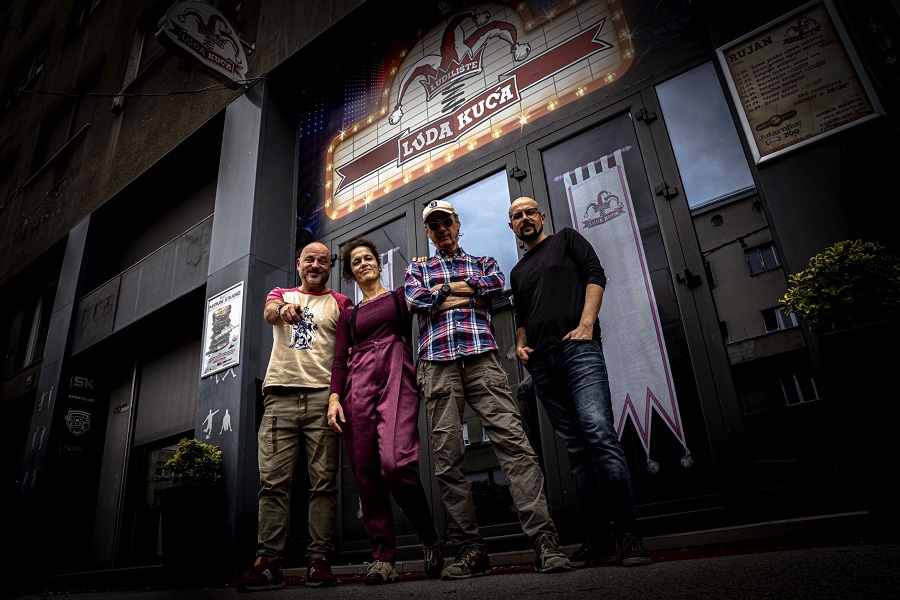
The play is co-produced by Triko Cirkus Theatre, Luda Kuća and artist Ivan Đuričič. It is a motion comedy intended for everyone, the actors communicate exclusively with body movements accompanied by sound effects and good music, which is why there are no language barriers. Both David Shiner and Ivan Đuričič act in the play, beside them on stage are Bojan Ban, Iskra Jirsak, Nikolina Majdak and Iva Peter Dragan. Following its premiere on October 3rd, the play will take place again on Thursday, October 6th.
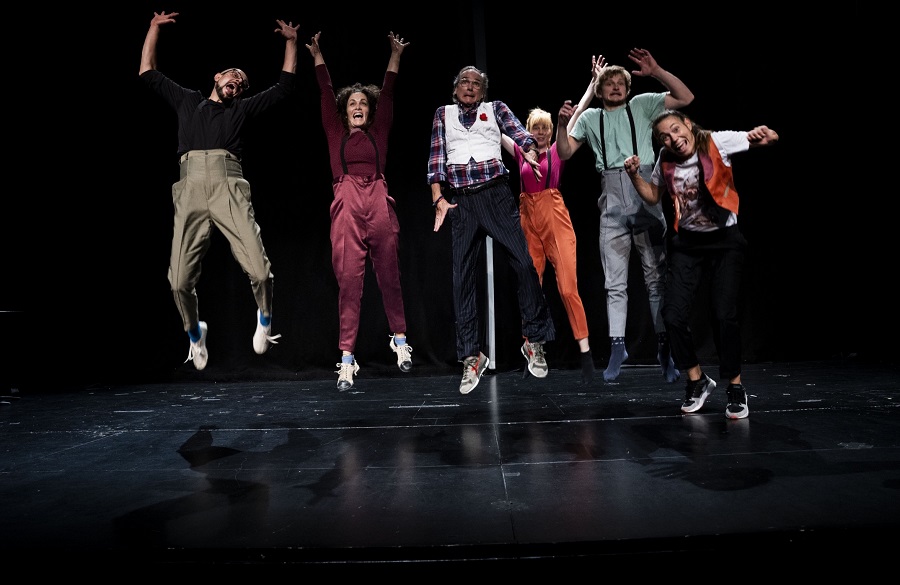
What will you watch, who will you watch, and what will you laugh at?
The world master of motion comedy and clowning, David Shiner, after Cirque du Soleil, found himself in Zagreb where he discovered the five samurai and decided to tell a story with them. Now called the six magnificent fools, they will be providing the Croatian audience with an evening of laughter, chaos and fun that will take them to the mystical East exclusively using the instruments of movement, sound and music.
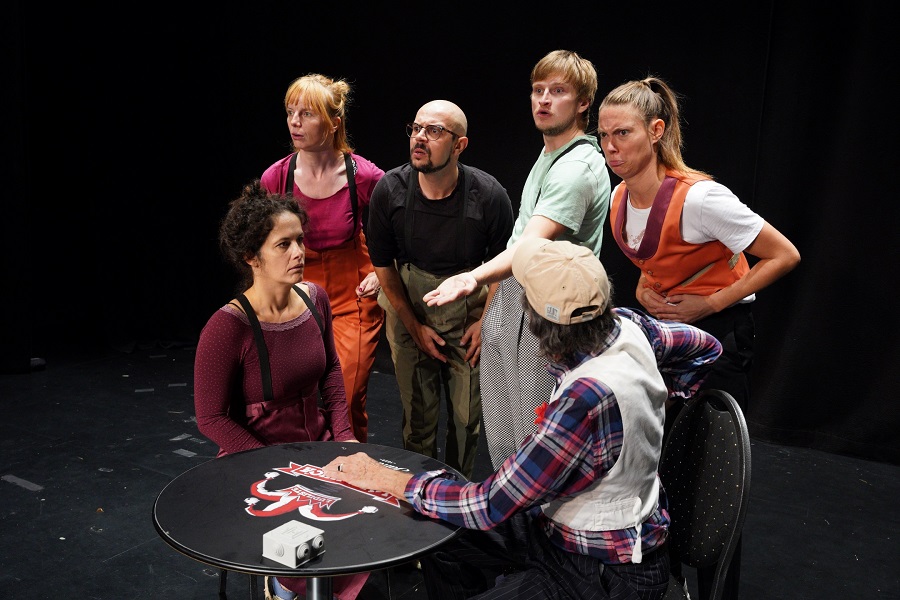
Through a series of events that had their world premieres, David Shiner attempts to answer the question of whether there is life after death while presenting several of his own clown gags that have been firing up on Broadway and Cirque du Soleil. These events have been interpreted and prepared specially for the Croatian audience.
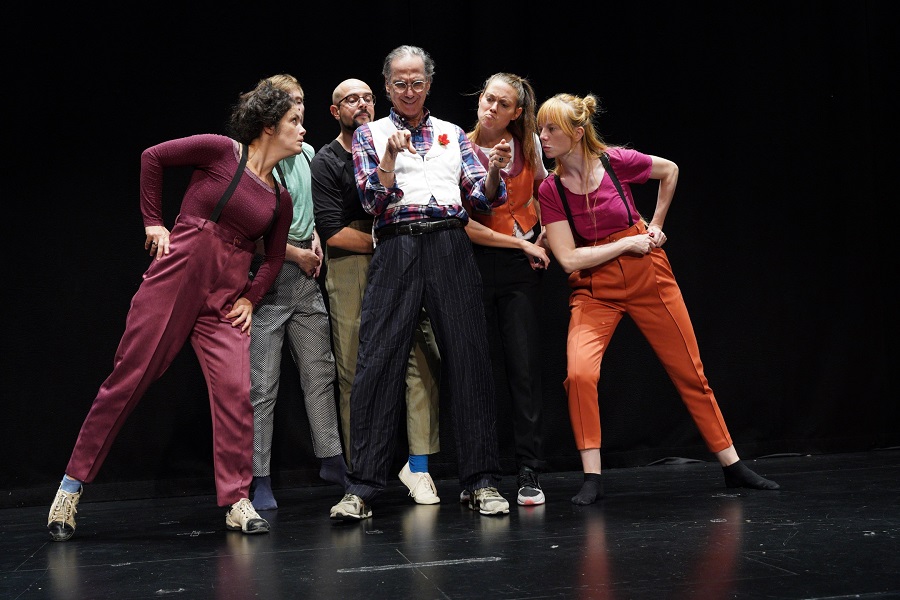
How did the idea and collaboration come about?
The Croatian audience has not had the opportunity to see this type of play in its recent history of theatre. Its co-producers, Triko Cirkus Theatre and Luda Kuća explained how the idea surfaced after a statement made by Ivan Đuričić: "David Shiner came to Croatia following an invitation by Triko Cirkus Theater in 2018 and held a clown workshop in Zagreb during which several very humorous scenes created the clown samurai." This gave him the idea for a new play, and thanks to the excellent Croatian actors, who are acting in the play, decided to do it in Zagreb. "That's where we got involved. We rolled up our sleeves. However, our process was slowed down by the Coronavirus pandemic, but here we are today. We are ready to cheer people up, make them laugh and bring the spirit of the world-famous Cirque du Soleil and Broadway to Zagreb through Luda Kuća on the street of Zvonimirova."
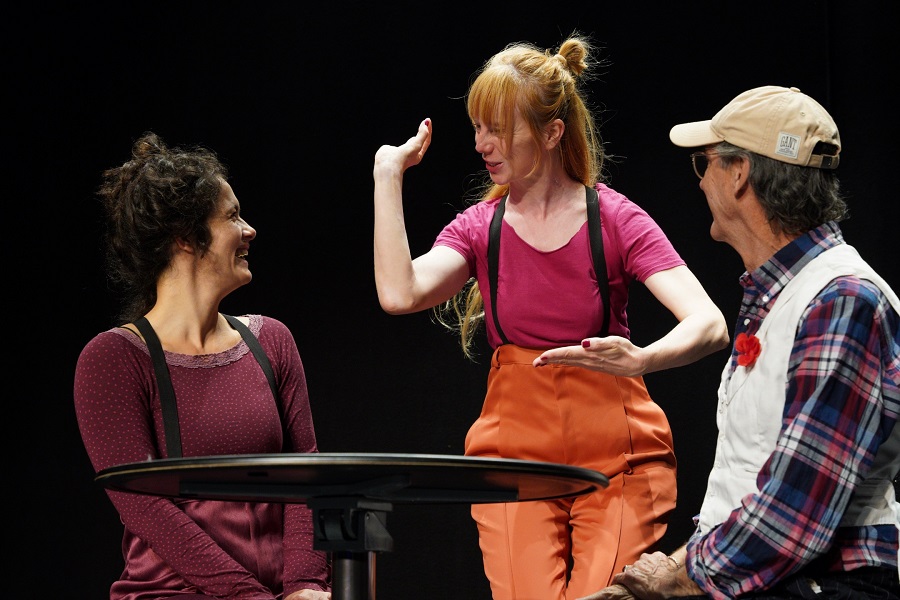
"After 40 years of working in the world of motion theatre, I really felt, and still feel, immense happiness that I discovered a group of actors in Croatia entirely dedicated to accepting and building new theatres without fear or doubt, instead with great joy. I can't wait for the "Komik Motion Show"; and the ensemble that makes the wonderful Zagreb audience laugh, relax and cheer up". said the Broadway, Cirque du Soleil, and now Luda Kuća star, David Shiner.
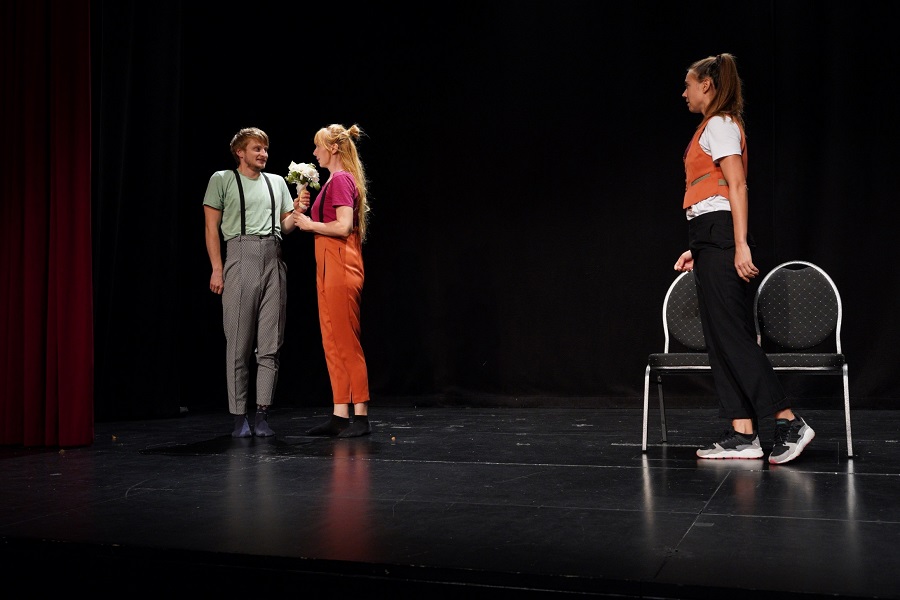
Iva Peter Dragan, artistic director of Triko Cirkus Theatre, continued: "I am especially glad that a clown and a comedian of such calibre chose the city of Zagreb and its actors to work on his latest play. I am glad as producers and as clowns that he recognized our potential and desire to offer something different from what the local audience is used to seeing, although it's risky. Laughter in theatre is too little, sincere emotions even less, and that's why I hope the audience will accept and embrace us."
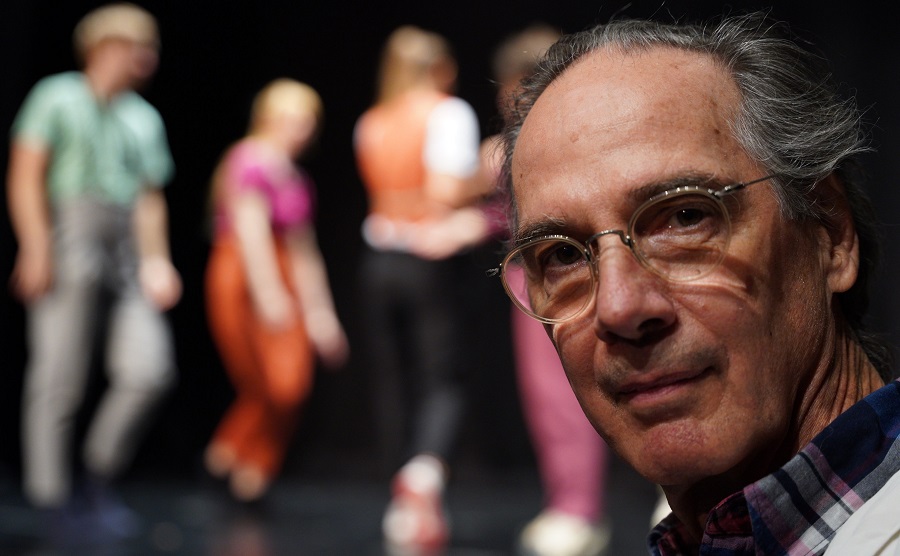
On behalf of Luda Kuća, its co-owner Rene Bitorajac added that the "Komik Motion Show" perfectly fit into the philosophy and the direction of the theatre. As he further explained, the play "Komik Motion Show" will be on the billboards of Luda Kuća to play in two parts. There is the premiere on October 3rd, and the next performance will take place on Thursday, October 6th. Because Shiner is a great globally renowned artist and is engaged in various projects, his show "Kooza" is currently being performed in Cirque du Soleil, the next dates of the "Komik Motion Show" will be set according to the availability of our actors and, of course, of Shiner himself.
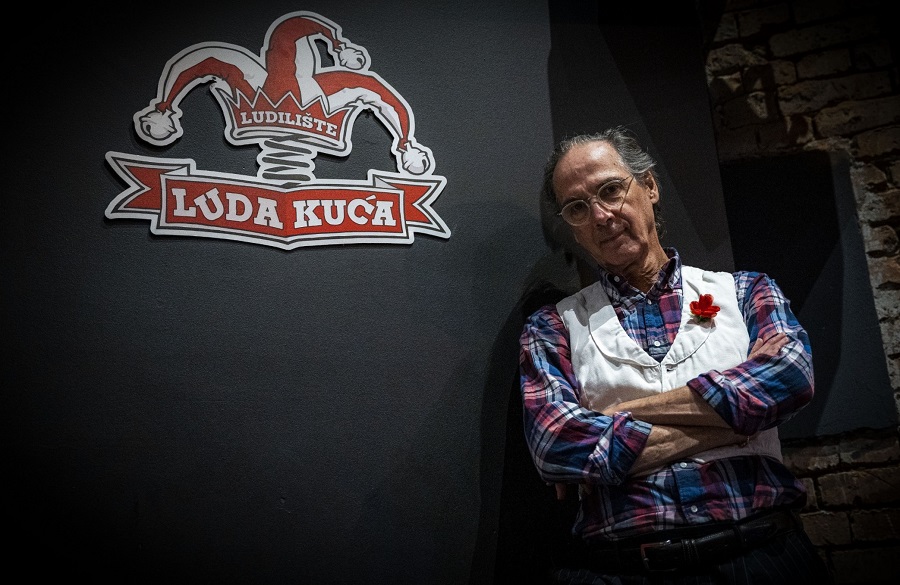
Croatia Moves to Top of Nations League Group with Win against Denmark in Zagreb!
September 22, 2022 - Croatia beats Denmark 2:1 in Zagreb and moves to the top of their Nations League group!
Croatia and Denmark met at a sold-out Maksimir Stadium in Zagreb on Thursday night in the 5th round of the Nations League.
Before tonight's match, Demark led the group with nine points, while Croatia was two points behind with 7. A win would bring them to the top of the group.
Croatia also played for the first time in their new kits, which they will wear at the 2022 World Cup in Qatar.
The winner of the group travels to the Nations League final tournament, which is scheduled for June next year, while the bottom team moves to League B.
Before the national anthems, recently retired national team member Šime Vrsaljko was honored by the Croatian Football Federation. 22,715 fans were in attendance.
Lineups
Croatia (4-3-3): Livaković - Juranović, Josip Šutalo, Gvardiol, Sosa - Modrić, Brozović, Kovačić - Pašalić, Kramarić, Perišić
Denmark (4-3-3): Schmeichel - Andersen, A. Christensen, Kjaer, Maehle - Wass, Höjbjerg, Delaney - Skov Olsen, Eriksen, Braithwaite
Match Report
Luka had the first attack of the match in the 2nd minute and played up the pitch with Kramaric. Luka took the ball to the goal line and got Croatia's first corner. Luka sent the ball in, but Sosa played back into the box to find Gvardiol's head. Brozovic shot over the goal in the 5th minute.
Perisic and Kramaric played up the left wing in Croatia's next attack, but Perisic played to the keeper. In the 7th minute, Mario Pasalic sent the ball in front of the opponent's goal, but it was cleared by the defense.
Denmark finally began possessing from the 10th minute. Sosa cleared a dangerous shot by Eriksen and Croatian regained possession. Luka was brilliant again in the 15th minute, dribbling into the Denmark box and crossing into the penalty area. No Croatia player could get to the ball quick enough. Denmark then forced a quick counter which resulted in their first corner.
Croatia's best chance came in the 16th minute when Perisic crossed into the box from the goal line. The ball was then played out to Kovacic, who shanked over the goal.
Perisic's shot in the 21st minute also went over the goal. Daniel Wass had a great chance for Denmark in the next play but just missed the goal.
Another great attack for Croatia in the 25th minute went out for a corner. The ball ultimately found Gvardiol's head but went out of play.
Livakovic saved a dangerous chance from Denmark in the 34th minute. Joakim Maehle fought for space but show low in the middle of the goal and straight into Livakovic's hands.
Ivan Perišić received a yellow card in the 36th minute.
Eriksen shot from outside the box in the 38th minute, forcing Livakovic to punch the ball out for a corner.
Croatia kept possession with short passes and waited for a hole in the defense. The match ended 0:0 at halftime.
The second half started without any changes.
Croatia's first corner of the second half came in the 47th minute. The ball came out to Borna Sosa at the top of the box, who shot low in the bottom left corner of the goal for 1:0 Croatia!
Kramaric shot from a distance in the next attack but went over the goal.
Modric was fouled on the edge of the box in the 56th minute. Perisic shot low near post but hit the outside net.
Denmark made their first subs in the 60th minute. Mikkel Damsgaard came on for Martin Braithwaite, Rasmus Hojlund for Thomas Delaney, and Rasmus Kristensen for Daniel Wass.
Luka and Perisic had a great play in the 65th minute, and Luka's shot was blocked by the Denmark keeper. Kramaric tried to score on his own in the next attack but played to the Denmark defense.
Kovacic missed a great opportunity in the 69th minute.
Dalic subbed off Pasalic, Perisic, and Kramaric for Vlasic, Orsic, and Petkovic in the71st minute. Mathias Jensen was subbed for Simon Kjaer.
A lapse in the Croatia defense gave Eriksen space to shoot in the 77th minute. The Denmark star nailed the upper corner of the goal to tie the game.
Mateo Kovačić was replaced by Lovro Majer in the 79th minute, which resulted in a goal seconds after he entered the pitch. Majer shot with his left foot into the right corner of the goal for 2:1 Croatia!
Croatia's defense cleared a dangerous Denmark chance in the 84th minute. The play continued and Livakovic kept the game a 2:1.
Denmark was hungry to equalize, but Croatia remained solid. Vlasic had a chance in the 90th minute, and the ref added 4 mins of stoppage time. Denmark had a scary chance in the final minutes.
Luka Modric was subbed off in the 2nd minute of stoppage time for Domagoj Vida.
The match ended 2:1 for Croatia! Croatia plays Austria next on Sunday in Vienna.
To follow the latest sports news in Croatia, follow TCN's dedicated page.
Croatian Returnee Reflections: Marijana Begonja, from Mississauga CA to Zagreb
September 23, 2022 - Whisper it quietly, but more and more people are relocating to Croatia from the diaspora. In a new TCN series, we meet them to find out how they are faring and what advice they have for others thinking of making the switch. Next up is Marijana Begonja, who moved from Mississauga, CA, to Zagreb.
My name is Marijana Begonja. I was born in Zadar, Croatia, in 1987. In 1988, my family moved to Mississauga, Ontario, Canada. At 21, I decided it was time to try something I’d thought a lot about before: moving to Croatia. First, I moved to Dubrovnik to complete my university education; then, I moved to Zagreb to pursue my professional career. Currently, I work as a Senior Sales Manager at Procter & Gamble. My family is scattered between Croatia and Canada, with my sister, brother-in-law, and their 3 children living in Toronto, my brother living in Zagreb, and my parents spending their retirement going between Privlaka (our hometown), Mississauga, and Zagreb. We hope one day that we’ll all be permanently together in Croatia.
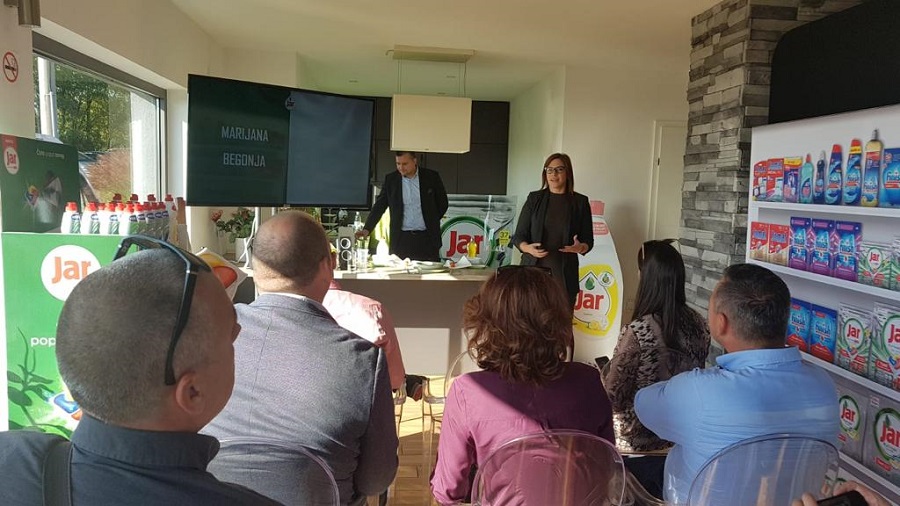
1. You made the switch to Croatia. Tell us a little about the decision process and how long it took for you to get on the plane.
When we moved to Canada, I was a baby, but my older sister was 9, so she always had the desire to move back to Croatia and made a move in 2004. At the time, I was in high school, and she was looking into universities in Croatia for me. However, as I’m not a huge risk taker, I ended up deciding to go to university in Canada for graphic communications management. At some point, I realized it was not something I wanted to do for the rest of my life, and started working at a bank. At 19, working at a bank and living from home, I thought I didn’t need university, so I dropped out. My parents were adamant about me getting a university education as they knew the potential was there and worked very hard in Canada to secure us a bright future. They both even worked 2 jobs at a time, so I felt I couldn’t let them down. I decided at that point it was now or never and applied to a university in Croatia. Once I was accepted, the decision was made. It was a surprisingly short decision; in November 2007, I dropped out of university in Canada, and in August 2008, I was on a plane to Croatia.
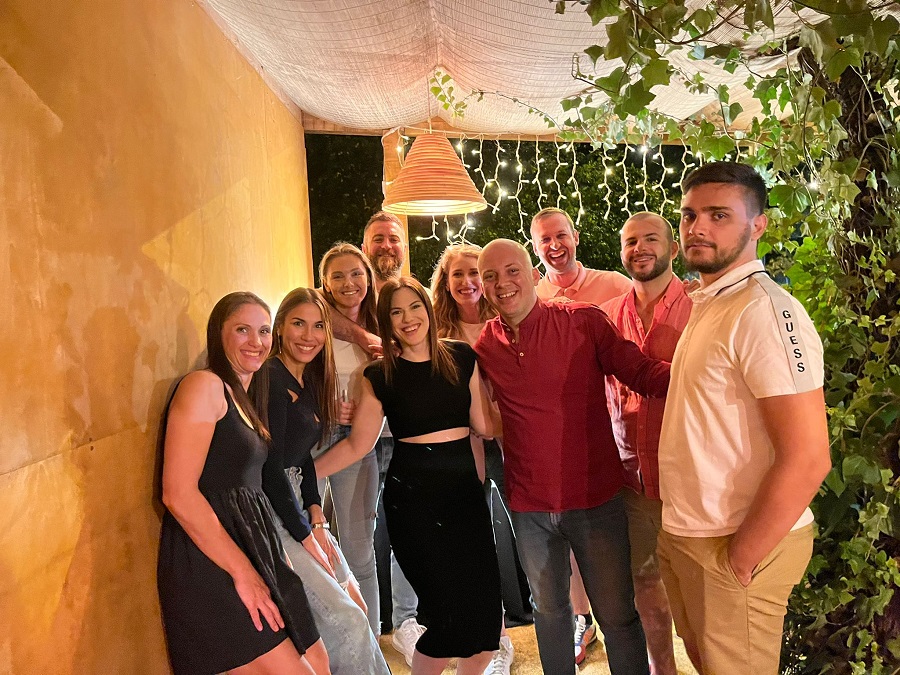
2. What did your family and community back home think of your decision at the time?
Overall I had huge support across the board. My father was probably the most supportive as it was his dream for us to move back (we were only supposed to move to Canada temporarily, but unfortunately, the war changed this). He immediately started looking for apartments for me to rent. My mom, knowing my nature of not liking change, was supportive as long as I was happy but had a feeling I might change my mind after 2 weeks. She was also happy that her daughters would be together again but still sad that another child was moving away. The hardest part was leaving my little brother behind. He was 13 at the time, and both my sister and I had a big role in raising him given the age gap, and suddenly at a critical time in his life, he would be alone. Of course, my sister was the most excited as we would be reunited once again and started making a million plans for us to do together. My friends were fantastic and made sure my last few months in Canada were ones to remember and made sure to keep in contact once I left. We had multiple going away parties and even started some traditions that still last to this day. My boss at the bank where I was working at the time was extremely supportive despite my resigning shortly after getting promoted, telling me this was something I really needed, meaning it was time for me to step out of my comfort zone.
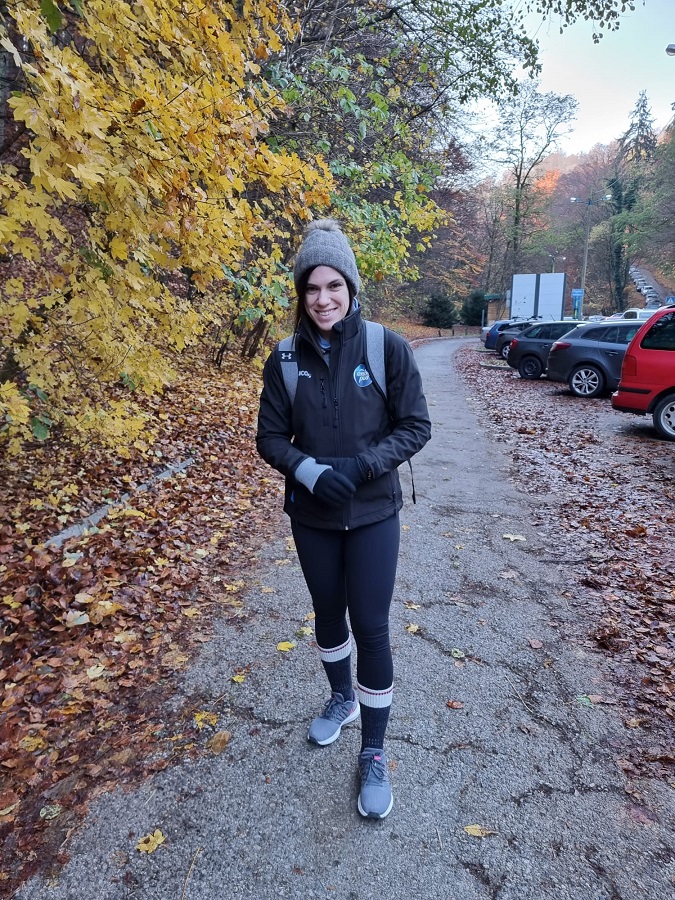
3. Where did you get your information about the realities of Croatia prior to coming?
My sister is probably the best big sister anyone in the world could ask for. If it wasn’t for her paving the path for me, I never would have made a move. She helped me with a lot of the administration, documents, setting up a bank account, etc. She went everywhere with me, making the process easy for me, whereas when she came, she had to figure it all out on her own. She gave me a lot of advice on all aspects of life in Croatia, so I would say I was well prepared.
4. What were you most nervous about making the switch? What was your biggest fear, and what was the reality of what you found?
After spending two years at university in Canada and deciding not to continue and changing my direction into economics, I pretty much lost those two years. I was afraid that if I failed, I would lose more time in my life and have to start somewhere from scratch again. My second greatest fear was letting my family down. Throughout my entire life, they were my support system, and if I realized I made a mistake at some point, I was worried about letting them down. Luckily for me, very soon after moving back, I knew I was going to stay for good. The lifestyle was much more fit to my personality, honest friendships which quickly formed the ability to meet with someone at any given point for a coffee. As an extrovert, this was a huge positive for me. At university, I was quickly getting good grades, and in my first semester, I made the dean's list, so I realized I finally found a path suited for me.
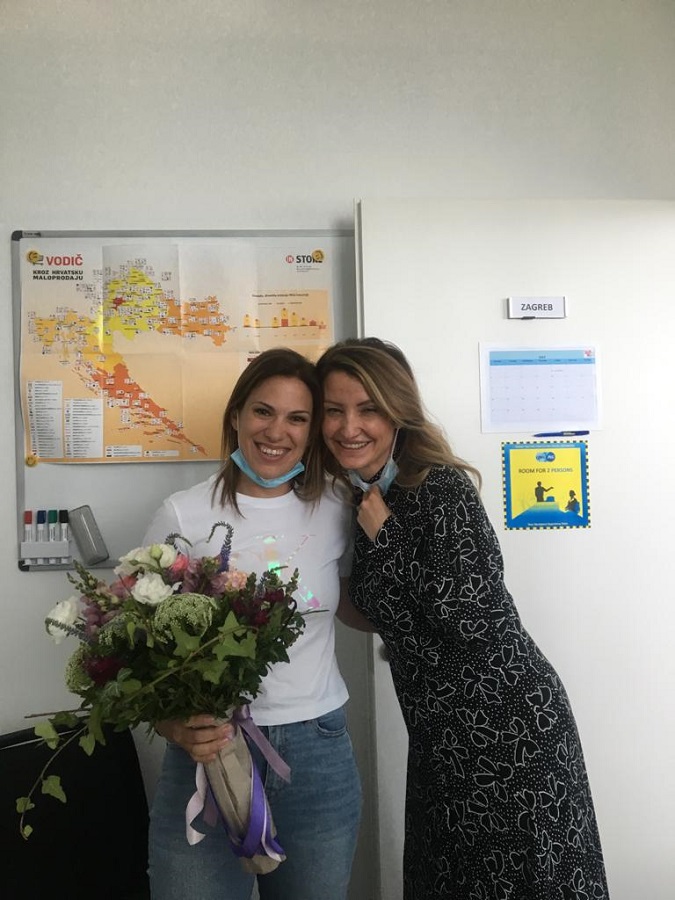
5. Think back to the time before you arrived. What were your perceptions about Croatia, and how were they different from the reality you encountered?
I have to commend my parents here because, thanks to them, I would say my perceptions were very realistic. Unlike a lot of other diasporas, they weren’t so focused on teaching me the history (which, of course, they did), they encouraged me to understand the present situation in Croatia throughout all the years and the progress it was making. They didn’t focus so much on the difficult times such as the war but focused on the prosperity post-war. I had cousins my age in Croatia on my mom’s side, and she encouraged me to stay in contact with them, which helped a lot. My dad encouraged me to discover things such as current music and things that would interest me. So thanks to all this, I would say my perceptions weren’t way off. There were two things for which I would say my perceptions were a bit different than reality. Firstly being from Zadar, for me, Dalmatia was Croatia, and all of the beauties of Croatia were in Dalmatia. Thanks mostly to my job, I had the pleasure of exploring all parts of Croatia, both rural and urban, and realized that Croatia has so many beautiful gems across the country, and Dalmatia is just one part of it. The second thing is I knew my Croatian wasn’t perfect and was afraid I would get made fun of a lot for this and tried to hide it as much as possible. It was the exact opposite, people find it endearing, and to this date, I embrace my “undefined” accent.

6. You are still here, so obviously, the pros outweigh the cons. Tell us about some of the things that you love about being in Croatia, as well as some of the things you don't like.
Correct, the pros outweigh the cons. The biggest pro for me is the overall social aspect. Firstly, people are more honest in Croatia. Let me give an example – in Canada, if you run into an acquaintance, you say “how are you?” to each other, but really it’s just a formality, and if you answer anything other than “good, thanks”, you’re weird. In Croatia, though, you answer honestly, and you engage in conversation. Friendships and relationships, I would say, develop faster because a lot of personal time is dedicated to socializing, and it’s more than just coffee as the perception. It’s going for a walk, playing a sport together, etc.
Geographically Croatia is perfect. In one day, I can be at the top of Sljeme, and the next day it’s a few hours' drive to the seaside. Croatian nature offers something for everyone. Also, being located in Central Europe, so many destinations are easily accessible. Weekend trips are the norm, whether in Croatia or outside the borders. I feel that despite Canada being a multicultural country, I have gained so much more cultural knowledge of the world while living in Croatia. In general, I feel more intelligent about my knowledge of the world since moving here. There’s much more curiosity to discover things outside the world we live in here rather than in Canada.
One other thing I feel is significantly better in Croatia than in Canada is the security financial institutions provide. Croatia was using chip cards in masses while Canada was still in magnetic strips. Additionally, as internet banking and apps developed, I feel like Croatia was always a step ahead in providing great services while still maintaining high security. It seems to me that cases of identity theft and such were more frequent in Canada, but this could be due to the nature of my job in Canada.
The main thing that I wish I could change in Croatia is customer service. In Canada, a sales associate in stores is extremely friendly (too much, in my opinion) and constantly asks you if you need help. In many stores in Croatia, you’re lucky if you get “izvolite” (here you go). I guess being exposed to two extremes, I wish Croatia would find itself in the middle. Especially when it comes to escalations. In Canada, most disputes can be resolved on the spot or over a phone call. Whereas any complaint or dispute always has to be handled in writing in Croatia and can take months to resolve. Also, in Canada, the question “can I speak to your manager” usually results in a resolution, but in Croatia, the answer is always no.
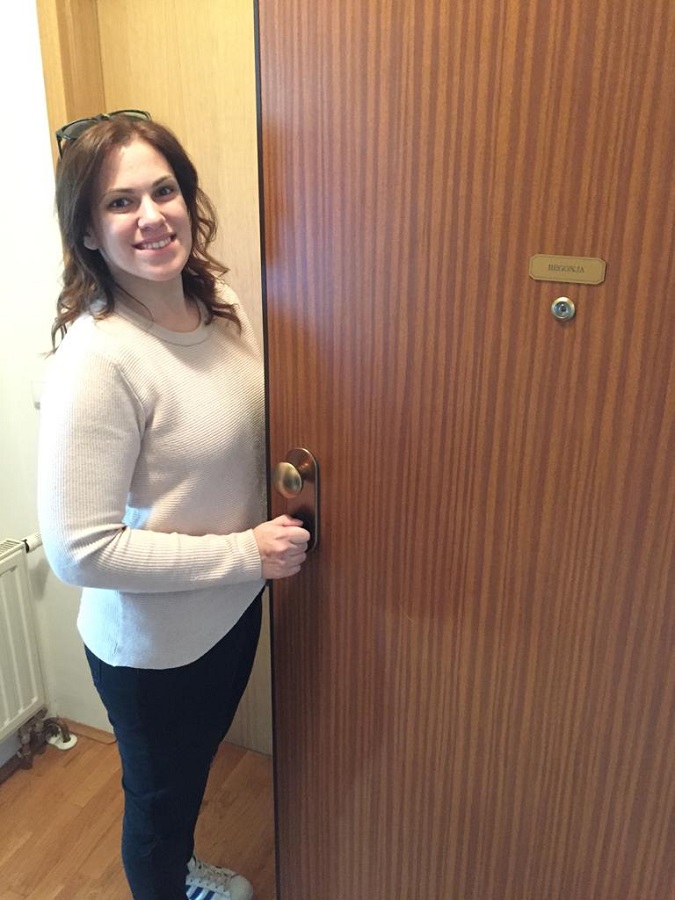
7. What advice do you have for others thinking about making a move from the diaspora?
Don’t expect life in Croatia to be just like your 4-week summer vacation in Croatia. A lot of people come on vacation and think I could live here and make a move and realize it’s a lot different than they realized. Another thing is to avoid comparisons. In my case, Canada and Croatia are two widely different countries, from history to economics. You can’t compare, for example, a salary like for like because yes, in Canada it will be absolutely much higher. There are so many things that go into the prices and costs of things that simply aren’t comparable. Why I say this is yes, probably if you’re coming from a diaspora, you’re coming from somewhere with a higher income, but in most cases, the cost of living is also significantly higher so really, what you make of that salary is up to you. For example, after only 3 years of working full-time in Croatia, I became a homeowner relatively close to the city center. If I took the same parameters into account in Canada – the same job at the same company, similar location to the city center, similar size, there is no way I would be able to be a homeowner that quickly. So yes, in Canada, I would be making much more, but at what expense?
One more important piece of advice – don’t listen to naysayers and people giving their negative advice. I remember when I started job searching here, everyone told me I would not find a good job without a connection. I made it my mission to do the exact opposite, and after only 3 months of searching, I was working at an entry-level position at my current company and have made significant strides in my 8 years in the company without knowing a single person. My advice is anyone who wants to work in Croatia can work. The path might be rougher, but regardless I genuinely believe that anyone can succeed.
8. How do you think Croatia can better assist those who are looking to return to the Homeland?
There are two significant things - one is directly related to returnees and the diaspora, and the second is a bit broader.
In relation to returnees and the diaspora, Croatia should try to work more with the communities outside of Croatia and their education in Croatia. As a kid, my parents enrolled me in all the activities the Croatian community had to offer – folklore, tambura, Saturday Croatian school, and to be honest, most of my knowledge of Croatia, the culture, and the language didn’t come from there, it came from home. Grades 1-11 of Croatian Saturday school, and I never once learned padeži (cases). I can't blame the diaspora communities – often, it's 1st 2nd, and 3rd generations trying to keep the Croatian culture alive, and for them, I have respect. However, if they were given more help, guidance, and resources from Croatia, we could have 5th generation Croatians speaking Croatian as if they've lived here and know that Ljiljana Nikolovska is, in fact, not the current lead singer of Magazin or that drmeš (folklore) is not danced at all weddings in Croatia. So much of what we know about Croatia is learned at home, and I am so thankful that my parents made an effort to teach me that being Croatian wasn't about hating Serbians, tattooing the GRB (emblem) on yourself, or being conservative. is what makes you Croatian. Croatia needs the diaspora to help build a prosperous future, but they need to enable them with the knowledge of what Croatia is in 2022, not what was decades or centuries ago.
The other thing Croatia needs to do is to make it a more investable country to make it attractive for returnees. In order for us to grow economically, much more significant step changes need to be made. Yes, they've made it attractive for digital nomads, but unfortunately, this attracts a small niche of people, and as mentioned, they are nomads. Croatia, especially with the declining population, needs sustainable solutions. So much onus is placed upon the employers through minimum wage increases or not taxing certain benefits given to employees, but still, the investment needs to come from the employers. In order to generate economic growth in an economy with a declining population, the Croatian government needs Croatians to spend. By reducing taxes, it gives higher purchasing power, and by alleviating the financial struggle of citizens by easing taxes, the government will still get the funding back through consumer spending. This, as a result, would make Croatia more attractive to those looking to return as they wouldn't take as big a salary cut moving to Croatia, and would make Croatia a much more attractive company for investment, therefore creating more jobs. I speak of this in a really simplified manner, but in order for people to return, Croatia needs to be more economically attractive, and I see this as the first step in that direction.
****
Thanks, Marijana!
You can follow more stories in the Croatian Returnee Reflections series in our dedicated TCN section.
Would you like your returnee story - positive or negative - to be featured in this series? Contact This email address is being protected from spambots. You need JavaScript enabled to view it. Subject Returnee.
****
What is it like to live in Croatia? An expat for 20 years, you can follow my series, 20 Ways Croatia Changed Me in 20 Years, starting at the beginning - Business and Dalmatia.
Follow Paul Bradbury on LinkedIn.
Croatia, a Survival Kit for Foreigners will be out by Christmas. If you would like to reserve a copy, email This email address is being protected from spambots. You need JavaScript enabled to view it. Subject 20 Years Book


